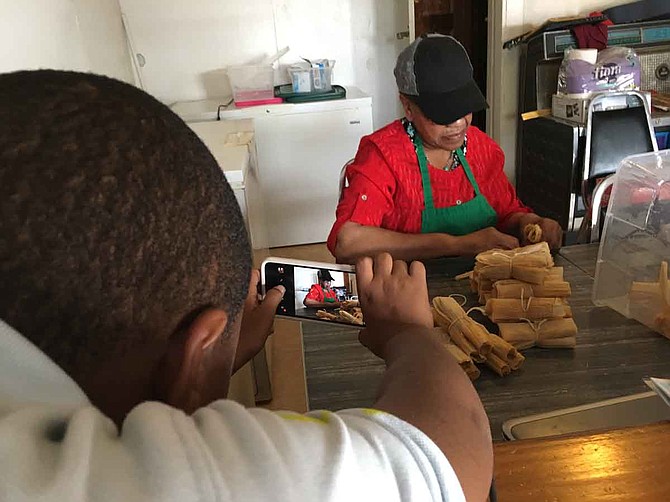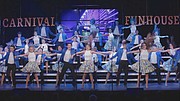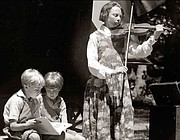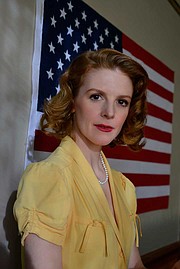"Rosedale Freedom Stories" is one of the films that will screen during this year's Crossroads Film Festival April 11-13. photo courtesy Blue Magnolia Films
The Crossroads Film Festival, which is in its 20th year, is April 11-13 at Malco Grandview Cinema in Madison, though some films will screen at Hal & Mal's. For more information, visit crossroadsfilmfestival.com.
Learning the Ropes at Crossroads Film Festival
This year marks the 20th anniversary of the Crossroads Film Festival, or XFF, which brings together local, national and international films to Mississippi. During the annual event, local film lovers and industry professionals can view independent projects, meet filmmakers and learn more about the film industry. Past festivals have offered "master classes" on important topics in the industry for local aspiring filmmakers. For the 20th anniversary, organizers saw an opportunity to expand on those offerings.
On Saturday, April 13, 2019, one of the three screens the festival will be specifically designated for the master-class offerings. Those sessions provide in-depth looks at the intricacies of the many aspects of film production, and they give novices a forum to learn industry secrets from professionals.
Crossroads Festival Coordinator Michele Baker says that these classes differ from previous year's workshops because they are curated more than in the past and all feature experts in the movie business.
"These have been specifically planned," she says. "We sought out industry professionals whose work is well-known in these areas (to teach them)."
During the first session at noon, "Motion and Emotion: Using Light to Tell a Story," Oscar Nominee Roberto Schaefer, who has served as the director of photography for "Finding Neverland," "Monster's Ball," "The Kite Runner" and "Quantum of Solace," will discuss cinematography. The encore class of the evening "From the Page to the Screen: Crafting Comedies for TV and Film" will feature comedy writer David Sheffield, a Mississippi native who has worked on screenplays such as "The Nutty Professor," "The Nutty Professor II: The Klumps," "Police Academy" and "Coming to America." He ha written for Saturday Night Live and was one of Eddie Murphy's primary comedy writers.
Philip Scarborough, XFF copresident, cofounder and festival director, says the classes offer valuable insights for local professionals who are interested in advancing their skills in filmmaking. Baker adds that although the classes are geared toward improving the knowledge base of professionals in the state's film industry, even those not interested in the production aspects of the business may find them interesting and useful.
"One of the classes that we have in the middle of the day is 'How to Get Your Kids in the Movies' by casting director (Cher Foley)," Baker says. It will offer information for parents interested in finding film opportunities for their children.
Using one entire theater to host classes for a full day means that the festival will show fewer films. In past years, Crossroads has shown between 125 and 130 films of various lengths. This year, the festival will only show around 100. Baker says that it is a worthy sacrifice.
"We made the conscious decision to say screen B will show no films this year," she says. "We're only going to do classes. They take the place of films at what is (commonly known as) a film festival. That is how important we feel these (master classes) are."
Baker adds the class offerings fulfill one part of the XFF mission: "to educate and promote the craft of filmmaking in Mississippi."
"We have people who are at the top of their game, and they are coming to share this information with people who are trying to become more professional in their lives as filmmakers," Baker says.
The two expect the classes fill up quickly as festivalgoers learn more about the topics and presenters. They hope the master-class offerings become a permanent addition.
The Crossroads Film Festival is April 11-13. Most films will show at Malco Grandview Cinema (221 Grandview Blvd., Madison). Master classes begin at noon on April 13 and run through 7:30 p.m. They are $10 and open to the public. For more information, visit crossroadsfilmfestival.com or find the event on Facebook. — Torsheta Jackson
Into the World of Show Choir
If you have lived in the Jackson metro area long enough, there's a decent change you've heard Clinton High School's show choir, Attache.
The group holds the longest winning streak in show choir history: It has won the title of grand champion 80 out of 89 competitions. Its longest winning streak was 22 championships from 2001 to 2008. As of March 2019, the choir is currently at 18 wins. And Attache is now the subject of a film of the same name, which Melissa Pace Overholt directed.
The film covers everything from the group's founding in 1981 to the rigors of being in the show choir. Along with interviews from students in the choir, filmmakers also talked to those who have gone through the program and went on to greater things, including Lance Bass, a singer, dancer and actor most known for his time with NSYNC.
The film "Attache" illustrates why something like the show choir is important to a place like Clinton and Mississippi, and the passion of the people involved.
Attache" will show at 4:45 p.m. on Saturday, April 13, during the "Attache" film block on screen A at Malco Grandview Cinema (221 Grandview Blvd., Madison). — Amber Helsel
The Ultimate Taste-Taster
The film, "Masters," which Mark Ward wrote and directed, is a mockumentary that focuses on Abbie Pastuszek (Shannon Meehan) as she prepares for one of the hardest tests in the world: the "Masters" test that determine the world's elite taste-testers.
"It took seven tries, two failed marriages and a hip replacement to pass the Masters Test, but it is the greatest achievement of my life, including the birth of my children and my several degrees," one of the characters, Col. Quincy Pedroza (Fredric Lehne) says at one point.
For most of the film, Pastuszek is sitting at a table with Pedroza, taste-testing chips in preparation for her exam. These elements communicate the seriousness of taste-testing, from Pastuszek breaking down in tears during an interview to her washing her mouth out after each test. The best part of the film is the commentary while trying each chip. She often speaks quickly when judging each chip, and most of it pertains to the food she's judging, but the longer she tries everything, the more ridiculous her commentary gets. For example, she describes the texture of one of the chips as "not unlike the Martian surface."
This is a great film for anyone who likes comedy and food.
"Masters" shows during the "'White Guys Solve Sexism' and Other Comedic Tales" film block at 1 p.m. on screen C at Malco Grandview Cinema (221 Grandview Blvd., Madison). — Armani T. Fryer and Amber Helsel
'Old Time Music'
The short documentary from Damien Blaylock, "Great Big Yam Potatoes!", is a story about the Great Big Yam Potatoes folk-music gathering, and the community these Mississippi folks songs have created.
The film explores the influence of "fiddle culture" on the state and its history. It also shows how Mississippi benefitted from President Franklin Delano Roosevelt's Federal Music Project, which he started in 1936. For part of the project, a team went to Mississippi to research folk music around the state. This project led to more than 3,500 "fiddle tunes" collected throughout Mississippi. The film also shows how that research is still pivotal to the community's aim of keeping these songs alive.
The historical story it told against the backdrop of sounds and scenes of musicians and others playing some of the tunes on the sprawling green campus of Jefferson College in Natchez, Miss.
Throughout the documentary, viewers learn what makes Mississippi fiddle tunes unique and the importance of preserving parts of our musical culture.
"Great Big Yam Potatoes!" will show during the "'Music Saved Us' and Other Music Docs" film block at 3 p.m. on Saturday, April 13, on screen A at Malco Grandview Cinema (221 Grandview Blvd, Madison). — Brynn Corbello
Hunt or be Hunted
"The Fox," a short animation film from Tehran, Iran, explores what it means to be the hunter and the hunted, as well as how quickly those tables can turn.
The film is a fast-paced journey with dazzling geometric designs, haunting orchestral strings, and cues of color that guide the story along. Based on a 200-year-old story from Iran's Qajar kingdom, the film covers a day in the life of a fox as he hunts, tries to seize a chance at love and eventually becomes the hunted. Viewers watch the chase as it results not in the fox's death; instead, the hunter places a bell around his neck, taking away stealth, his greatest skill.
After this, the fox still has his same set of duties in life, even though he can no longer be stealthy. The film explores how he struggles through events that were nearly impossible feats for this animal before, and how the moments with the hunter and his dogs haunt him.
Director Sadegh Javadi Nikjeh's use of only music and sound effects in the film serves to create a more intense experience as the fox fights starvation and waning hope. The film uses mystical elements through animation to show how he will reclaim his order of hunter rather than hunted. The ending, though, might surprise viewers.
"The Fox" will show during the "'Turned to the Sun' and Other Visually Striking Shorts" film block on screen A at 4 p.m. on Thursday, April 11, at Malco Grandview Cinema (221 Grandview Blvd., Madison). — Brynn Corbello
Tales of Freedom
Good stories can come from anywhere, but oftentimes the most compelling ones come from places that have seen hard times. Many of Mississippi's great tales, from the origin of the blues to some of the state's sports greats, come from the Delta—one of the financially poorest regions of the state, but also one of the culturally richest.
Cue stories like those in the "Rosedale Freedom Stories" film in this year's Crossroads Film Festival. The photo-essay-turned-movie is part of the Rosedale Freedom Project, a modern-day initiative that seeks to elevate young leaders in Delta towns, specifically Rosedale, through community building, artistic creation and grassroots organizing. In August 2018, eight youth ages 12 to 15 attended Youth Leadership Workshop & Media Immersion, in which they learned about civil rights and civic engagement, and media such as photography. The project eventually turned into "Rosedale Freedom Stories."
The film tells the stories of some of the people in the town, from Barbara Pope, owner of the White Front Cafe; Mildrette Netter White, an Olympic gold medalist; and Rosedale police officer Conchetta Turner.
It provides a compelling narrative for one town in the Delta, from the photos of Rosedale and of the subjects to voice-overs from the participants themselves.
The film screens during the "Freedom Stories" film block at 11:45 a.m. on Saturday, April 13, on screen A at Malco Grandview Cinema (221 Grandview Blvd., Madison). — Amber Helsel
Laying Everything Bare
Viva Las Vegas' words, "Stripping is an art, and strippers are artists," set the scene for the documentary, "Thank You for Supporting the Arts."
The film is about the life of Liv Osthus, a Portland-based, 40-something stripper who performs as Viva Las Vegas.
"Thank You" lays her life bare and reveals what life is really like for a stripper. It also shows all facets of her from her being a mother to a musician to a cancer survivor, and how her Viva Las Vegas and Liv Osthus personas compare and contrast.
Interviews with her, her friends, former boyfriends, parents and other relatives, and even her surgeon tell her intensely personal story, warts and all.
As each piece of clothing is stripped away (metaphorically speaking), another aspect of her life becomes real and is told in such a way that the viewer can feel the emotion of it.
"Thank You for Supporting the Arts" is a powerful and inspiring story of a woman who decides to live her life outside of society's expectations, of her victories and defeats and of her never-give-up attitude to life.
"Thank You for Supporting the Arts" shows on screen B during the film block of the same name on Friday, April 12, at 5 p.m. at Malco Grandview Cinema (221 Grandview Blvd., Madison). — Richard Coupe
Can White Guys Solve Sexism?
"White Guys Solve Sexism" is a farcical romp through absurdity that tackles some of Hollywood's reaction to the #metoo movement. In the film, two clueless men (those two words go together don't they?), Mike and Clark, are horrified by the reach and breadth of the Harvey Weinstein scandal and the revelations that the movement brought forth.
Director and producer Christopher Guerrero said in an interview about the film: "They told me about a number of male filmmakers from a famous university coming together to mourn the 'loss of filmmaking' in a post-Weinstein world. These men were so blindsided and shocked that women could be treated so terribly for so long... and they didn't even know. While Weinstein's abuse is both shocking and horrifying, it is far from the first sign of sexism in the film industry."
Though the film is short at less than seven minutes, it packs a comedic and thoughtful punch. Leah Lemarr, a standup comic and actress, plays Veronica, Mike's wife, in the film. She has the best lines and facial expressions as she tries to manage the meltdown of the two men, Mike (Max Baumgarten) and Clark (Kyle Helf) as they struggle to understand what has happened. At one point, she rolls her eyes and deadpans, "Of course 'Good Will Hunting' is sexist. They let Matt Damon do math before they let a woman."
It may seem like an absurd premise on the surface, but it is one that is worth thinking about when you see this film.
Like Voltaire's "Candide" or Jonathan Swift's "Gulliver's Travels," this is a first-rate satirical farce, one that will make you laugh at the absurdity, but leave you uneasy with the truth in it.
"White Guys Solve Sexism" screens during the "'White Guys Solve Sexism' and Other Comedic Tales" film block at 1 p.m. on screen C at Malco Grandview Cinema (221 Grandview Blvd., Madison) on Saturday, April 13. — Richard Coupe
Alone in the Universe
The Emissary" makes it clear that space can be one of the loneliest places in the universe if you are by yourself.
The short film, which Bryan Tan directed, is about a scientist, Liv Laika (Viviana Chavez), on a solitary mission to the planet Yaghan to find her ancestors who left the Earth almost a century ago. She is an emissary whose mission is to restore diplomatic ties with the people of Yaghan.
The film starts with Laika's unnamed significant other (Jonathan Horne) talking about how she left a life behind to fulfill her mission. "For a moment, there was no distance between us," he says. "Now the sun's light will not reach you in a lifetime. You were sent to restore the broken bond. You shatter another."
Then, the first few scenes inside the spacecraft are fairly mundane—she eats, sleeps, prunes plants—but the film gets exponentially more dramatic as she approaches Yaghan and begins almost constantly broadcasting to them. She tries over and over to contact them, and the longer no one answers, the more frantic she gets, and the more the viewer can see how the mission has affected her. She has sacrificed her life on earth to travel 100 light years to find those who left, and now she is on this solitary journey.
The film communicates that loneliness well, specifically with its shots of space and other special effects. The message touches on the impermanence of time and sacrificing oneself for the greater good.
"The Emissary" will screen on Saturday, April 13, during the "'Helios' and Other Thrilling and Sci-Fi Stories" film block at 6:45 p.m. on screen C at Malco Grandview Theater (221 Grandview Blvd., Madison). —Amber Helsel
Growing 'Roots and Wings'
"Roots and Wings," a documentary from Collins, Miss.,-based filmmaker Hanna Miller, highlights one family's struggle with poverty in south Mississippi.
Leatrice Black, the narrator of the film, supports her husband Robby Black and their 7-month-old son Caleb by working at Ward's, a food joint known for its chili dogs and burgers. However, Leatrice desperately wants Robby to get a job so that the family can live off more than one income, with the eventual goal being to get their own place.
The film also highlights the problems that stand in their way, including a lack of decent jobs in Collins and Robby's attention-defecit hyperactive disorder. He does not have the insurance or funds to afford medication. Most of his previous employers fired him because of his inability to focus without his medicine.
"Roots and Wings" is a compelling documentary that highlights issues such as teenage parenthood, poverty and living in a rural, small town. Despite addressing these heavy topics, the film also features lighthearted scenes from the family's everyday life, including conducting a Bible study and parenting Caleb. It also seems to support the theme of loving life no matter what path you may be on.
"Life is about what you make it out to be," Robby says at one point in the film.
In the end, the couple find a silver lining in their troubles.
"Roots and Wings" will show during the "'Her Body' and Other Shorts by Female Filmmakers" film block on screen B at 6:45 p.m. on Friday, April 12, at Malco Grandview Cinema (221 Grandview Blvd., Madison). —Armani T. Fryer
Negro Terror
Punk may not seem like a genre that promotes unity, but for Omar Higgins, the founder, bass player and lead vocalist of Memphis, Tenn.,-based African American punk band Negro Terror, it was a way to do just that. The band has been around since 2015, and is now the subject of a Southern Documentary Projects film of the same name.
The band is made up of young African American men who use their music to highlight social issues such as racism and police brutality.
One major theme of "Negro Terror" is the band's representation as black men in a genre that people perceive as traditionally white.
One fan of the band says, "We don't have that representation. It means a lot to see a band that looks like me."
Interviewees in the film also talk about rock-and-roll and how, though people may perceive it as a "white" genre, its roots are African American.
While the film focuses on the band Negro Terror, it also gives a viewers a critical look at Memphis and some of the issues that persist in the city. For example, Higgins talks about the gentrification of Midtown and the racism in the city.
The camera-work is one aspect of this film that makes it interesting. It juxtaposes the interviews and the band performing with scenes from Memphis, footage from a #Fightfor15 march in the city and more.
The film is compelling because not only does it tell the story of a punk band; it paints a picture of them as both musicians and activists.
"Negro Terror" will show during the "'Music Saved Us' and Other Music Docs" film block at 3 p.m. on Saturday, April 13, in screen A at Malco Grandview Cinema (221 Grandview Blvd., Madison). — Armani T. Fryer and Amber Helsel
The Delta Girl
"The Delta Girl," which Jackson, Miss., native Jaclyn Bethany directed and co-wrote as part of her master's degree from the American Film Institute, tells the story of one woman whose eyes are opened after she witnesses a murder.
At first, the story, which is set in the 1960s-era Mississippi Delta, seems a little too filled with rural southern cliches, such as the girls beautifully coiffed in their white-and-blue smocks at their all-white girls school with a brilliantly white school building with Corinthian columns, set against the dark and muddy "Delta" filled with white boys drinking and roughhousing, and generally being stereotypically male.
After a senseless act of white-on-black violence, the rest of the movie seems to head toward a re-imagining of white people's behavior in that era, and how some white person would come to their senses and see justice done.
But the film surprised me and headed in another direction. It's told from the perspective of Magnolia (played by Isabelle Fuhrman of "The Hunger Games"), a 17-year-old high-school student who witnesses the violence. Magnolia struggles with her conscience. She debates whether she should tell the sheriff, her father, that her brother is a killer or keep silent. "We killed him," she says at one point, seeming to recognize the larger complicity of southern women in racially motivated violence.
Magnolia knows that there can be no happy ending to this story and her despair is palpable. The film is worth watching and the angst and uneasy feeling it generates is one we need to remember.
"The Delta Girl" screens during the "'Her Body' and Other Shorts by Female Filmmakers" block at 6:45 p.m. on Friday, April 12, on screen B at the Malco Grandview Cinema (221 Grandview Blvd., Madison). —Richard Coupe














Comments
Use the comment form below to begin a discussion about this content.